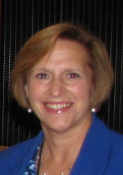NOMINATION SUMMARY
Patient safety is a main priority for Massachusetts General Hospital. Preparing patients for a safe discharge to home is challenging and requires collaboration from all involved with patient care planning. This institution identified the need for improved safety for patients discharged home on anticoagulant medications. Lynn Oertel, as the clinical nurse specialist (CNS) in the Anticoagulation Management Service (AMS), brings the perspective from ambulatory care. Erin Cox, CNS for the vascular surgical service, brings the acute care perspective, including preparing patients for discharge.
Lynn and Erin collaborated with a team of clinicians in medicine, case management, pharmacy, and Quality and Safety to improve the process for discharging patients on anticoagulation medication (warfarin) and provide multilingual educational resources for them. Review of practice identified two pathways for discharge: utilizing the prescribing resources of AMS or referral to PCP. This review of practice illuminated areas of needed improvement through enhanced communication and the development of a new practice flow.
Lynn and Erin met with role groups throughout the hospital clarifying the new process which went into effect during July 2013. They continue their outreach in order to assess process improvement over time.
NARRATIVE
The efforts led by Lynn and Erin fall into 3 primary groups: Transformation, Communication and Systems Change.
Transformation: Keeping in mind ‘what’s best for every patient,’ it was important to make the process consistent regardless of who ultimately would assume the role of the warfarin manager after hospital discharge. This required a change in the culture and approach to discharging patients on warfarin. Recognizing that some of our most vulnerable patients (i.e. those with no insurance, limited mobility) would be at risk of not getting the anticoagulant drug(s) they needed, Lynn and Erin worked closely with case management and pharmacy to explore alternatives for these patients. It is important for the institution and our patients that a seamless coordinated process is used for all patients.
Communication: Depending on the workflow process specific to each care unit, different role groups performed different functions at discharge. This required explicit communication among all care providers in order to ensure patient’s discharge needs were met in advance. Many patients are referred to AMS for home management and documentation, and improved communication with AMS staff provide a smooth transition from hospital to home. A written summary of the immediate post-discharge AMS plan is provided identifying agreed upon phone numbers to facilitate communication. For patients not referred to AMS, the discharging nurse and health care team are responsible to ensure the same transition from hospital to home or other care environment. In all cases, communication is essential to optimize patient safety and quality of care. To that end, a standardized, system-wide educational tool on warfarin was developed for use across all Partners hospitals. The “A Guide to Taking Warfarin” is now in its fourth edition. Lynn Oertel is actively involved in the writing and continued editing of this tool in order to make it valid and accurate for all settings. Time and attention was devoted to the use of color, appearance, and plain language to promote patient and family understanding. This tool is used for all patients discharged from MGH on warfarin and is electronically documented.
Lynn and Erin facilitated multiple presentations on care units and meetings to make the Guide, well known among providers and set the expectation for use. The Guide is available in print via Standard Registry (SR# 85474-English and SR# 85811-Spanish) and is stocked on all care units. Lynn manages the yearly institutional order for the English and Spanish print versions. Recognizing the multi-lingual needs of our patients, the Guide is also translated into 5 additional languages and is available electronically.
System’s Change: The changes to the warfarin discharge process were system-wide and thus required a system-wide, multi-disciplinary approach to implement the process change. To facilitate the speed at which the change would occur, our colleagues in information technology were able to draw upon data to help support the need for change and monitor how the process was implemented. They collaborated with clinicians to develop savvy communications strategies which helped alert clinicians to changes “at the moment.” In AMS, Lynn Oertel re-designed electronic tools and references used by nursing staff when communicating with clinical providers. Focus on monitoring the hospital’s safety report data specific to issues with the anticoagulation process was helpful in identifying possible barriers to success.
RESULTS
Massachusetts General Hospital continues to actively review safety reports to assess the impact and issues related to anticoagulation practice. The anticoagulation discharge “process” is no longer the focus of concern. Overall, feedback from clinicians feel the new work flow has simplified the prescription process and bedside clinicians can now focus on the unique and often complex needs of each patient they teach.
Erin Cox, CNS, was very instrumental in rolling out the added inpatient discharge needs around anticoagulation and disseminating the information to unit leadership and the 40 inpatient units in this large teaching facility. Unit-based staff nurses now present and reinforce the discharge instructions in a uniform manner utilizing our visual anticoagulation guides in the patient’s own language. The clinicians reinforce the same information, but individualize their patients’ specific information so that patients continue to understand the resources available after leaving the hospital.
Working in a large teaching facility like MGH encourages our staff to be the best. While many clinicians collaborate to bring about change, these two clinicians (Lynn Oertel CNS and Erin Cox CNS ) remind us every day how valuable the role of the Clinical Nurse Specialist is at MGH in process improvement. The clinician, educator, innovator, collaborator, leader and mentor that defines the CNS role is epitomized in their practice.
I believe Lynn Oertel CNS and Erin Cox CNS would be a great candidates for the John Q . Sherman Award for Excellence in Patient Engagement.






